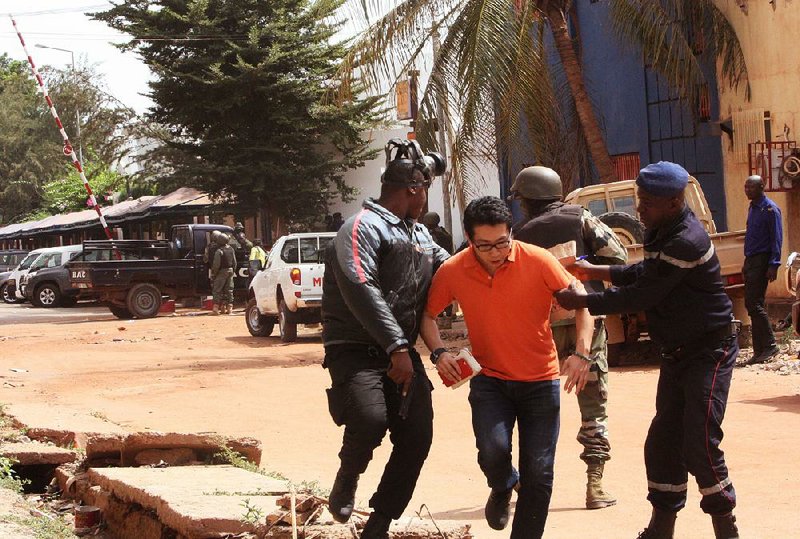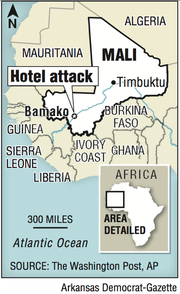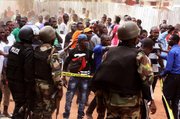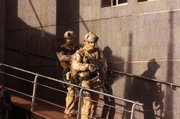BAMAKO, Mali -- Heavily armed Islamic extremists seized dozens of captives Friday at the Radisson Blu hotel in Mali's capital, but Malian troops, backed by U.S. and French special forces, swarmed in to retake the building and free many of the terrified captives.
At least 20 people, including one U.S. citizen, were killed along with two gunmen during the violent encounter that lasted more than seven hours, a Malian military commander said.
Malian state television said the government had announced a 10-day state of emergency beginning at midnight in Bamako as well as a three days of national mourning beginning Monday.
An extremist group known as the Mourabitounes, which is led by former al-Qaida commander Moktar Belmoktar, claimed responsibility for the attack in Bamako, a city of about 1.8 million people. It is within a few hundred miles of several other U.S. military partners in western Africa, including Senegal, Liberia and Guinea.
Though Malian Army Cmdr. Modibo Nama Traore had earlier said as many as 10 attackers were involved, he said Friday night that there may have been only two gunmen, both of whom were killed. A police officer at the hotel displayed photos of the two dead gunmen, their bodies riddled with bullets.
The attack began when assailants shouting "God is great!" in Arabic burst into the complex and opened fire on the hotel guards, Traore said earlier Friday. An employee who identified himself as Tamba Diarra said by phone during the attack that the militants used grenades.
About 170 guests and employees were initially taken captive, but some apparently escaped or hid in the sprawling, cream-and-pink hotel that has 190 rooms and a spa, outdoor pool and ballroom. The guests included visitors from France, Belgium, Germany, China, India, Canada, Ivory Coast and Turkey.
"It was more like a real terrorist attack," said U.N. mission spokesman Olivier Salgado. "The intention was clearly to kill, not to necessarily have people being hostage."
As people ran for their lives along a dirt road, troops in full combat gear pointed the way to safety. Local TV stations showed heavily armed troops in what appeared to be a lobby.
Monique Kouame Affoue Ekonde of Ivory Coast said she and six other people, including a Turkish woman, were escorted out by security forces as the gunmen rushed toward the fifth or sixth floor. Ekonde said she had been "in a state of shock."
Malian special forces went "floor by floor" to free captives, Traore said.
Traore said 126 people had been escorted to safety and that at least one guest reported the attackers instructed him to recite verses from the Koran as proof of his Muslim faith before he was allowed to leave.
Traore said 20 people had been killed, including an official with Mali's police force. In addition, he said five people were injured including two police officers.
Gunfire continued throughout the day at the hotel, which is popular with airline crews and other foreigners doing business in the capital, Bamako, but the shooting had stopped after dark.
Officials would not confirm that the entire complex had been secured by nightfall, although the only activity was firefighters carrying bodies to waiting ambulances.
A senior U.N. official said as many as 27 people had been killed, but that different casualty figures have been reported and the organization is working with authorities to get an exact total. The official spoke on condition of anonymity because the operation was still ongoing. Bodies were found in the basement and on the second floor, according to a preliminary assessment of the attack.
The U.S. State Department affirmed that one American was among the dead. In a statement issued late Friday by the victim's family, the American was identified as Anita Datar, 41, of Takoma Park, Md.
"We are devastated that Anita is gone," the statement said.
The Chinese Ministry of Foreign Affairs said early this morning that three Chinese nationals were among the dead in the attack on the Radisson Blu Hotel. China Railway Construction Corp., a state-owned company, later said the the dead were three of its senior executives traveling to Mali on business.
At least one Belgian citizen died in the attack as well. The nationalities of the other victims were not immediately clear.
American support
National Security Council spokesman Ned Price praised the bravery of the Malian, French, United Nations and U.S. security personnel who responded, adding that Washington was prepared to assist Mali's government as it investigates "this tragic terrorist attack."
U.S. special forces assisted, said Col. Mark Cheadle of the U.S. Army's Africa Command. At least six Americans were evacuated from the hotel, Cheadle said. U.S. officials were trying to verify the location of all U.S. citizens in Mali.
About 25 U.S. troops with U.S. Special Operations Command were in Bamako when the hotel was attacked, and helped escort guests who had left the hotel, according to two U.S. military officials who spoke on condition of anonymity.
"We do have some people who are assisting in the hostage recovery efforts at the hotel," said Chuck Prichard, a spokesman for U.S. Africa Command. "They helped move some of the civilians to secure locations as the Malian forces worked to remove the hostile forces from the hotel."
A second spokesman for Africa Command stressed that the troops played only a small role in the rescue operation.
"It's very important to understand they are not inside the hotel," said Navy Lt. Cmdr. Anthony Falvo said. "They're not kicking down doors or going after bad guys."
President Barack Obama, on a visit to Malaysia, said the deadly assault on a hotel in Mali is yet another reminder that the "scourge of terrorism" threatens many nations.
And he said the "barbarity" shown by Islamic extremists at the Radisson hotel Bamako "only stiffens our resolve to meet this challenge."
Obama said the U.S. is working to account for Americans who may have been at the hotel. He also extended condolences to families of the victims and thanked the security forces who responded.
A unit of French soldiers was sent to Bamako in support of Malian security forces, the French Defense Ministry said. About 40 special police troops also played a supporting role, France's national police service said.
The U.N. mission sent security reinforcements and medical aid to the scene, said U.N. deputy spokesman Farhan Haq. A few U.N. staff members were in the hotel but they got out safely, he added.
Throughout the confrontation, officials in various countries from Europe to Asia sought to find out whether their citizens staying at the hotel were safe.
Also reported safe were 12 members of an Air France flight crew and five from Turkish Airlines. All 20 guests from India were evacuated as well, said Vikas Swarup, spokesman for India's Foreign Ministry.
french intervention
While French President Francois Hollande did not link the violence at the Radisson Blu hotel with last week's bloodshed in Paris, he declared that France would stand by the West African country.
"Once again, terrorists want to make their barbaric presence felt everywhere, where they can kill, where they can massacre. So we should once again show our solidarity with our ally, Mali," he said. Mali is a former French colony.
The Mourabitounes group claimed responsibility for the attack in a recorded statement carried by Al-Jazeera. The group said it wanted fighters freed from Mali's prisons and a halt on attacks against northern Malians.
The Mourabitounes split from al-Qaida in the Islamic Maghreb, the group's North Africa, branch in 2013 after Belmoktar joined with another Malian militant group. The statement said the Mourabitounes had attacked in coordination with the "Sahara Emirate" affiliated with al-Qaida.
The French military operation in Mali in 2013 against Islamic extremists who were holding the northern half of the country was the first of several foreign interventions during Hollande's presidency. Those interventions have led to increased threats against France and its interests from extremist groups such as al-Qaida's North African arm and the Islamic State extremist group.
Northern Mali remains insecure and militant attacks have extended farther south this year, including Bamako. In March, masked gunmen shot up a Bamako restaurant popular with foreigners, killing five people.
France has 3,500 troops operating in Mali and four other countries in the Sahel region as part of a five-nation counterterrorism operation.
The Netherlands also has troops working with the U.N. mission. According to the Dutch Defense Ministry, about 450 of its personnel are involved in the mission. Most of the Dutch force is based in Gao, but there are a few officers at the U.N. mission headquarters in Bamako.
Information for this article was contributed by Baba Ahmed, Harouna Traore in Bamako, Robbie Corey-Boulet, Ivory Coast, Edith M. Lederer, Sylvie Corbet, Nicolas Vaux-Montagny, Christopher Bodeen and Christopher Torchia of The Associated Press; by Dionne Searcey and Adam Nossiter of The New York Times; and by Dan Lamothe, Craig Whitlock, Kevin Sieff, Brian Murphy and Sarah Kaplan of The Washington Post.
A Section on 11/21/2015




